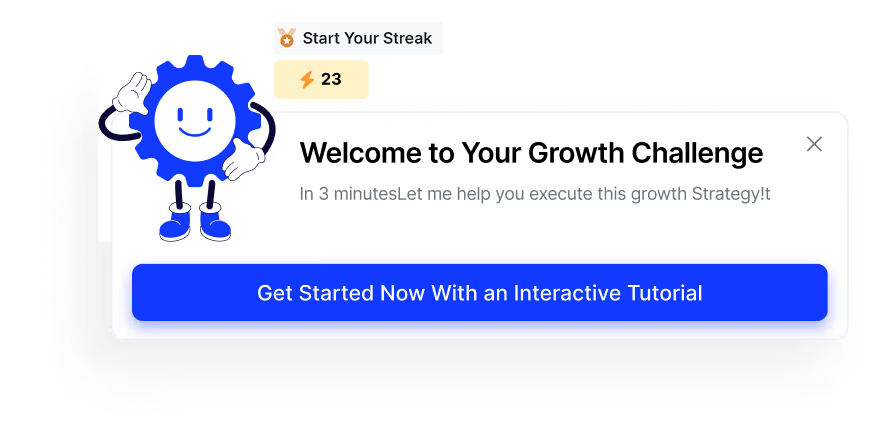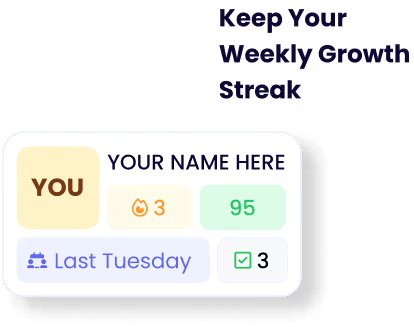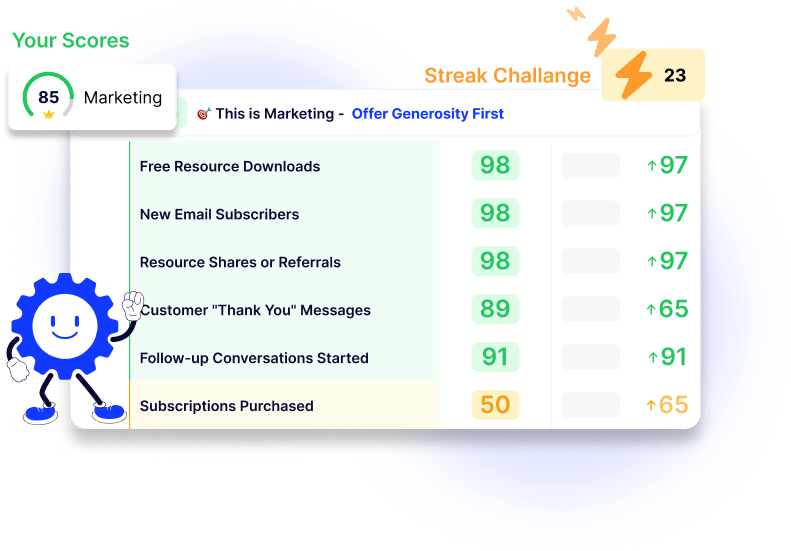Failure-Proof Portfolio Builder: Never Risk It All
Pick Your Book Strategy
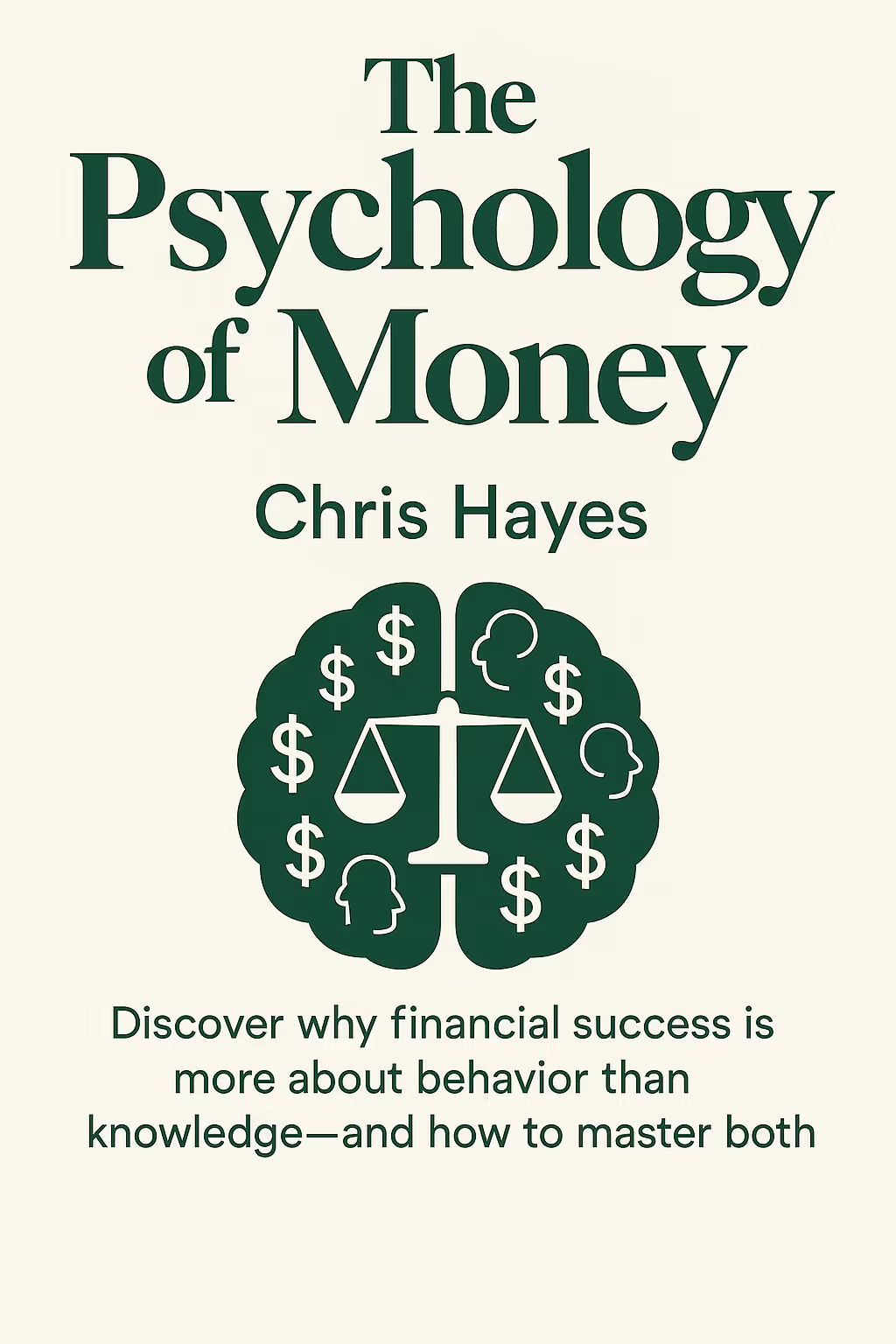

AI Builds Your Plan

AI Builds Your Scorecard
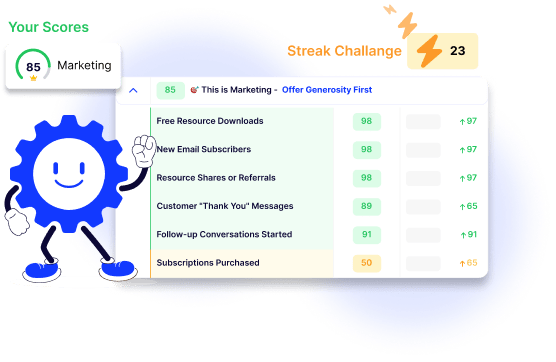
Key Metrics to Track Your Growth
The Psychology of Money: Transform Your Financial Mindset Into Lasting Wealth
✍️ Author: Morgan Housel
Why Do Smart People Make Terrible Money Decisions That Haunt Them Forever?
Picture this: Ronald Read, a janitor who amassed an $8 million fortune by the time he died. In the same year, Richard Fuscone, a Harvard-educated former Merrill Lynch executive, went bankrupt. What separated these two men wasn't intelligence or education—it was their relationship with money.
Morgan Housel defines the psychology of money as the emotional and behavioral patterns that drive our financial decisions. It's not about what you know—it's about how you behave. And behavior is hard to teach, even to really smart people.
The problem? We're taught finance like it's physics—with rules, laws, and formulas. But Housel's research shows that people don't make financial decisions on spreadsheets. They make them at the dinner table, thinking about their kids, their dreams, and their fears. A 2006 study by economists Ulrike Malmendier and Stefan Nagel proved this: people's investment decisions are shaped more by what the economy was doing when they were young adults than by any financial textbook.
The breakthrough: Housel discovered that financial success isn't about beating the market or finding the perfect investment strategy. It's about understanding your own psychology and building a system that works with your emotions, not against them. He shows that the gap between what we should do and what we actually do with money can cost us millions—literally. Low-income households spend an average of $411 annually on lottery tickets while 40% of Americans can't find $400 in an emergency.
Why now? In an era of meme stocks, cryptocurrency volatility, and economic uncertainty, understanding the psychology behind your money decisions isn't just helpful—it's essential for survival. The tools that worked for previous generations are becoming obsolete. The 401(k) didn't exist until 1978. Index funds are only 50 years old. We're all playing a game we're still learning.
Your advantage: We've transformed Housel's insights into 6 AI-powered tools that customize these strategies to YOUR specific financial situation, risk tolerance, and life goals.
The journey: In the next 15 minutes, you'll master 6 strategies from The Psychology of Money that reprogram your financial mindset. Each builds on the last to create Housel's complete system for building wealth that lasts generations.
6 Transformative Strategies for Financial Freedom Through Behavioral Mastery
Strategy #1: The Luck Audit - Separate Skill from Chance in Every Success Story
Morgan Housel introduces a counterintuitive truth: we systematically underestimate how much luck contributes to financial outcomes. Bill Gates wasn't just smart—he was one of the only teenagers in the world with access to a computer in 1968. But here's where it gets dangerous: when we ignore luck's role, we try to copy outliers whose success can't be replicated.
The evidence: Housel shares the story of how Microsoft's early success hinged on a series of fortunate events. Gates himself acknowledges that without attending Lakeside School—one of the only high schools in the world with a computer club in 1968—there would be no Microsoft. The odds? Roughly one in a million. Yet thousands of entrepreneurs try to replicate Gates' path without his advantages.
The insight: Housel believes this works because patterns are replicable while outliers aren't. When you study patterns of wealth creation across thousands of people instead of obsessing over individual success stories, you find actionable insights. For instance, multiple studies show that people who control their daily schedule report higher satisfaction than those who don't—that's a pattern you can act on.
The application: Instead of asking "How did Warren Buffett get rich?" ask "What do most wealthy people have in common?" You'll discover patterns like consistent saving, long-term thinking, and living below their means—strategies available to everyone, not just the lucky few.
Why this matters: This strategy solves the problem of chasing impossible dreams based on survivor bias, protecting you from catastrophic financial decisions based on unreplicable success stories.
The Pattern Recognition Engine
Purpose: Transform Morgan Housel's luck analysis framework into your personalized success pattern identifier.
Your Input:
- Your financial heroes and their success stories
- Your current strategies based on these examples
- Industry data on typical success rates
AI Output:
- Probability analysis of replicating specific successes
- Common patterns among 100+ successful people in your field
- Personalized action plan based on replicable patterns, not outliers
Time: 60 seconds from insight to implementation.
→ Discover Your Replicable Wealth Patterns
Strategy #2: The Wealth Invisibility Principle - Build Real Assets, Not Status Symbols
Morgan Housel makes a crucial distinction that most miss: being rich means having a high current income you can spend on visible items, but being wealthy means having money in the bank that you're NOT spending. The revolution? You can spot rich people by their cars and houses, but you can't see wealth—because wealth is the money not yet spent.
The evidence: Housel tells the story of a tech executive who drove a 10-year-old Honda despite earning millions. His neighbors with luxury cars assumed he was struggling. The twist? He retired at 50 with $12 million in the bank while his flashy neighbors still work into their 70s. The invisible wealth he accumulated by not spending gave him something money can truly buy: complete control over his time.
The insight: This works because when we see someone in a Ferrari, we think they're wealthy. But Housel explains they've actually transformed potential wealth into a depreciating asset. True wealth is hidden in boring places: index funds, savings accounts, and paid-off mortgages. The tragedy is we learn by copying what we can see, which teaches us to destroy wealth, not build it.
The application: Calculate your "invisible wealth ratio"—money saved versus money spent on visible status symbols. Housel's research shows that increasing this ratio by just 10% can accelerate your path to financial independence by 15 years.
Why this matters: This strategy breaks the toxic cycle of lifestyle inflation that keeps even high earners living paycheck to paycheck, unable to weather emergencies or seize opportunities.
The Stealth Wealth Calculator
Purpose: Transform Morgan Housel's wealth visibility concept into your personal wealth-building roadmap.
Your Input:
- Monthly income and current expenses
- Status symbol spending (cars, clothes, dining)
- Current savings and investment rate
AI Output:
- Your invisible wealth ratio and peer comparison
- 10-year projection of wealth with current vs. optimized spending
- Specific trade-offs: "That BMW lease = 5 years later retirement"
Time: 60 seconds from insight to implementation.
→ Calculate Your Hidden Wealth Potential
Strategy #3: The Time Arbitrage System - Convert Money Into Life's Most Valuable Asset
Housel's research reveals the ultimate purpose of money: buying control over your time. Psychologists have proven that autonomy—the ability to do what you want, when you want, with who you want—is the most reliable predictor of happiness. Yet modern knowledge workers think about their jobs constantly, feeling perpetually on-call.
The evidence: Housel cites end-of-life research showing people value relationships and experiences made possible by controlling their time. Not a single person wished they'd bought a nicer car. But here's the kicker: a study on workplace satisfaction found that employees who could choose their hours were as satisfied as those earning 40% more but with rigid schedules.
The insight: This works because of "reactance"—when people feel they lack control, they rebel by refusing to do even things they want to do. Housel shows how having "F-you money" isn't about telling your boss off—it's about small freedoms. The ability to take a sick day without fear. To leave a toxic job. To take a career risk. Each dollar saved buys you options.
The application: Calculate your "Freedom Number"—not for full retirement, but for six months of expenses. Housel's data shows this buffer transforms your psychology. You negotiate harder, take smarter risks, and paradoxically often earn more because you're not desperate.
Why this matters: This strategy solves the modern epidemic of feeling trapped despite high incomes, giving you the confidence to make better long-term decisions.
The Freedom Timeline Generator
Purpose: Transform Morgan Housel's time control principles into your personalized path to autonomy.
Your Input:
- Current monthly expenses and income
- Hours worked per week and job satisfaction score
- Specific freedoms you want (flexible hours, location independence, etc.)
AI Output:
- Your "Freedom Number" for different autonomy levels
- Monthly savings plan to reach each milestone
- Decision framework: "Is this purchase worth X days of freedom?"
Time: 60 seconds from insight to implementation.
→ Design Your Time Freedom Plan
Strategy #4: The Compound Patience Protocol - Let Time Do The Heavy Lifting
Warren Buffett's net worth at age 60: $3.8 billion. At age 90: $84.5 billion. Housel's revelation: $81.5 billion of Buffett's wealth came after his 65th birthday. The difference wasn't investment genius in his later years—it was decades of compounding finally showing exponential results.
The evidence: Housel contrasts Buffett with Jim Simons, whose Renaissance Technologies fund returned 66% annually versus Buffett's 22%. Yet Buffett is 75% wealthier. Why? Buffett has been investing for 70+ years while Simons started in his 50s. Those extra decades of compounding—not higher returns—created the gap.
The insight: Our brains can't grasp exponential growth. Housel shows that if you fold a piece of paper 50 times, it would reach the sun. Fold it 103 times? It's the size of the observable universe. After 20 years of 8% returns, your money has grown 5x. After 50 years? 47x. The difference between good returns and great returns pales compared to the difference between investing for 30 years versus 60.
The application: Start with any amount, but start TODAY. Housel's math shows a 22-year-old investing $100/month beats a 30-year-old investing $300/month. Time, not timing, is your greatest asset. Focus on staying invested through volatility, not finding the perfect investment.
Why this matters: This strategy defeats the destructive urge to chase hot stocks or time the market, behaviors that cause the average investor to underperform the market by 4-6% annually.
The Compound Reality Simulator
Purpose: Transform Morgan Housel's compounding insights into visceral understanding of your timeline.
Your Input:
- Current age and investment amount
- Monthly contribution capacity
- Risk tolerance and return expectations
AI Output:
- Visual timeline showing wealth at different life stages
- "What-if" scenarios: starting 5 years earlier/later
- Personalized mantras for weathering market downturns
Time: 60 seconds from insight to implementation.
→ Visualize Your Compound Growth Journey
Strategy #5: The Survival Priority Framework - Plan for a World That Refuses to Follow Your Plan
Housel shares a sobering insight: the three biggest economic events of the last century—the Great Depression, World War II, and the 2008 financial crisis—surprised even the experts. His principle: survival is the prerequisite for success. You must plan not for the probable future, but for the possible futures that could wipe you out.
The evidence: Housel tells of Rick Guerin, Warren Buffett's equally talented partner who used leverage to amplify returns. When markets crashed in 1973-74, Guerin was forced to sell his Berkshire Hathaway shares to Buffett for $40 each. Those shares are worth $328,000 today. Same skill, different approach to risk—one became the world's richest man, the other is forgotten.
The insight: Every great fortune has close calls with disaster. Amazon stock fell 95% during the dot-com crash. Most investors sold. Those who survived owned one of history's best investments. Housel's point: the ability to survive inevitable disasters matters more than maximizing returns during good times.
The application: Build your financial "margin of safety"—save more than you think you need, diversify more than seems necessary, prepare for setbacks that haven't happened in decades. Housel recommends assuming your future income will be lower and expenses higher than expected.
Why this matters: This strategy prevents a single setback from destroying decades of progress, allowing you to stay invested long enough for compounding to work its magic.
The Disaster Immunity Builder
Purpose: Transform Morgan Housel's survival principles into your personalized financial defense system.
Your Input:
- Current assets and debts
- Income sources and stability rating
- Top 5 financial fears/potential disasters
AI Output:
- Vulnerability score across different crisis scenarios
- Specific safeguards needed (emergency fund size, insurance gaps)
- Monthly action plan to build "unbreakable" financial foundation
Time: 60 seconds from insight to implementation.
→ Build Your Financial Survival System
Strategy #6: The Enough Calibrator - Know When You've Already Won
Rajat Gupta had $100 million but wanted to be a billionaire. His envy drove him to insider trading, destroying his reputation and freedom for an extra $17 million he didn't need. Housel's lesson: the hardest financial skill is getting the goalpost to stop moving.
The evidence: Housel shares research showing that beyond meeting basic needs, the correlation between wealth and happiness is surprisingly weak. But the pursuit of "more" can cost everything. He tells of Long-Term Capital Management, run by Nobel laureates, which blew up by risking what they needed to gain what they merely wanted.
The insight: "Enough" isn't about settling—it's about recognizing when the potential gain isn't worth the risk to what you already have. Housel explains that capitalism is brilliant at generating wealth and envy. Your neighbor's new Tesla makes your Honda feel shabby. But someone envies YOUR Honda. The cycle never ends unless you consciously break it.
The application: Define your "enough" with specific numbers: the house you'd be happy in forever, the experiences that matter most, the legacy you want to leave. Write it down. Review it when envy strikes. Housel's framework: never risk what you have and need for what you don't have and don't need.
Why this matters: This strategy prevents lifestyle inflation and dangerous risks that destroy wealth just when you should be enjoying it.
The Enough Equation Designer
Purpose: Transform Morgan Housel's "enough" philosophy into your personalized contentment blueprint.
Your Input:
- Current lifestyle costs and satisfaction rating
- "Dream life" expenses and their importance ranking
- Comparison triggers (what makes you feel "behind"?)
AI Output:
- Your personalized "Enough Number" with components
- Risk assessment: what you might lose chasing "more"
- Daily affirmations based on what you already have
Time: 60 seconds from insight to implementation.
Your Path to Unshakeable Financial Peace
Morgan Housel's strategies form a complete behavioral system: Understand luck's role, build invisible wealth, buy time not things, harness compounding, survive anything, and know when you've won.
The System: Each strategy reinforces the others. When you accept luck's role, you stop chasing unreplicable outliers. When you build invisible wealth, you buy time. When you have time, compounding works. When you survive setbacks, you stay invested. When you define enough, you protect what matters.
The Source: Morgan Housel, a partner at Collaborative Fund and former Wall Street Journal columnist, developed this approach through studying thousands of financial success stories and failures, distilling patterns that transcend market conditions.
The Choice: You now understand the psychology that drives financial success or failure. Which mental model will you reprogram first?
The Action: Pick the strategy that addresses your biggest psychological weakness with money. Click the link. Input your real numbers. See your personalized path today.
Morgan Housel provided the insights into human nature. AI provides the personalization to your exact situation. You provide the wisdom to act.
Click. Apply. Thrive.™


